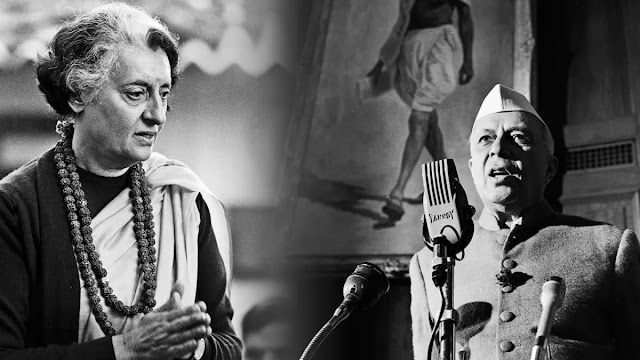Nehru foresaw the impending conflicts with judiciary over socialist reforms but preferred constitutional amendments over influencing judicial appointments. But Indira had other plans.
 |
| Stepping out of his shoes: Indira Gandhi and Jawaharlal Nehru |
The gradual upping of the ante by the Narendra Modi government against the judiciary–led by law minister Kiren Rijiju and aided by the likes of Vice-President, Jagdeep Dhankhar, has reminded people of the Indira Gandhi regime which is when the judiciary-legislature conflict reached a tipping point. Between 1967 and 1984, when judges gave verdicts against the government on issues crucial to the ruling party’s policies, the government retaliated by interfering with judicial appointments and the judiciary acted in different ways–some judges standing firm, some allegedly ready to cleave.
The conflict between the two arms, or the possibility of it, is not new to India. In 2018, when India’s Attorney General, KK Venugopal, took potshots at the Supreme Court, saying that he hoped the concept of ‘constitutional morality’ died soon, he invoked India’s first Prime Minister, Jawaharlal Nehru’s, apprehensions. His comments had come against the backdrop of the SC relying on ‘constitutional morality’ in the verdicts on high profile cases such as the reading down of Section 377 (homosexuals) and entry to the Sabarimala temple (menstruating women). “Unless it (constitutional morality) dies the former Prime Minister, Pandit Jawaharlal Nehru’s, fear of the Supreme Court becoming the third chamber of the Parliament may come true,” Venugopal had said.
Some found it ironic that the AG had to invoke a prime minister whom India’s ruling force since 2014 have blamed and criticised the most. But in that Constituent Assembly speech on September 10, 1949, Nehru had strongly opined that “the legislature must be supreme and must not be interfered with by the courts of law in such measures of social reform.” That day, while speaking on the Congress’ commitment to abolishing zamindari or landlordism, he said that “no legal subtlety and no change is going to come in our way” and that “within limits, no judge and no Supreme Court can make itself a third chamber.” The ‘third chamber’ remark comes from calling the Lok Sabha the first chamber and the Rajya Sabha the second.(ads2)
“No Supreme Court and no judiciary can stand in judgment over the sovereign will of Parliament representing the will of the entire community. If we go wrong here and there, it can point it out, but, in the ultimate analysis, where the future of the community is concerned, no judiciary can come in the way. And if it comes in the way, ultimately the whole Constitution is a creature of Parliament,” Nehru had argued.
Nehru, nevertheless, laid stress on the need to respect the Judiciary because he thought elected publicly representatives could go wrong in moments of passion and excitement. Then, the Judiciary, “in the detached atmosphere of the courts… should see to it that nothing is done that may be against the Constitution, that may be against the good of the country, that may be against the community in the larger sense of the term.” Even then, the Judiciary “should draw attention to that fact” but not “function in the nature of a third House.”
Nehru had also spoken of two ways to deal with times when the Judiciary came in the way of the Legislature implementing social reforms–one, to amend the Constitution; the other, the executive appointing judges. He deemed the latter as, “not a very good method” as it could mean appointing, “judges of its own liking for getting decisions in its own favour.”
Now, 73 years later, the debate has come alive again, with the government objecting to the apex court’s striking down of the 99th amendment to the Constitution in 2014 that sought to replace the Collegium system of judicial appointment with that of a National Judicial Appointments Commission, which would have given the Legislature a broader role in the appointment of judges.
 |
| A thoughtful beginning The Cabinet of India on 31 January. 1950 |
Nehru himself had agreed to the idea of amending the Constitution—the first amendment coming as early as 1951 to ensure that the court did not come in the way of the abolition of zamindari, nationalisation of industries and businesses and ensuring special provisions for people from backward classes. It created the Ninth Schedule, wherein, once included, a law becomes immune to being challenged in court for violating the fundamental rights of individuals.





